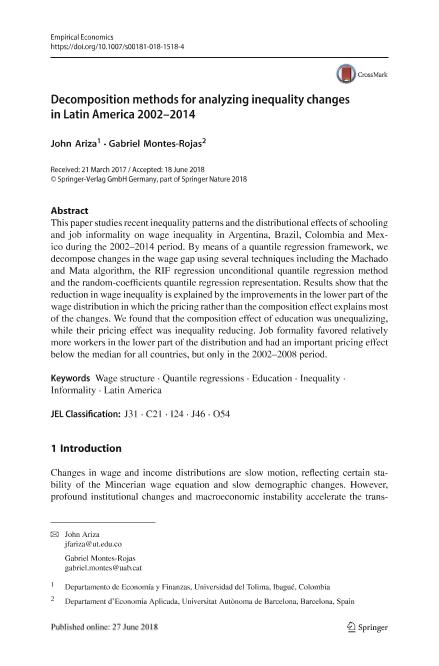Artículo
Decomposition methods for analyzing inequality changes in Latin America 2002–2014
Fecha de publicación:
27/06/2018
Editorial:
Springer
Revista:
Empirical Economics
ISSN:
0377-7332
Idioma:
Inglés
Tipo de recurso:
Artículo publicado
Clasificación temática:
Resumen
This paper studies recent inequality patterns and the distributional effects of schooling and job informality on wage inequality in Argentina, Brazil, Colombia and Mexico during the 2002?2014 period. By means of a quantile regression framework, we decompose changes in the wage gap using several techniques including the Machado and Mata algorithm, the RIF regression unconditional quantile regression method and the random-coefficients quantile regression representation. Results show that the reduction in wage inequality is explained by the improvements in the lower part of the wage distribution in which the pricing rather than the composition effect explains most of the changes. We found that the composition effect of education was unequalizing, while their pricing effect was inequality reducing. Job formality favored relatively more workers in the lower part of the distribution and had an important pricing effect below the median for all countries, but only in the 2002?2008 period.
Archivos asociados
Licencia
Identificadores
Colecciones
Articulos(IIEP)
Articulos de INST. INTER. DE ECONOMIA POLITICA DE BUENOS AIRES
Articulos de INST. INTER. DE ECONOMIA POLITICA DE BUENOS AIRES
Citación
Ariza, John; Montes Rojas, Gabriel Victorio; Decomposition methods for analyzing inequality changes in Latin America 2002–2014; Springer; Empirical Economics; 57; 27-6-2018; 2043-2078
Compartir
Altmétricas




